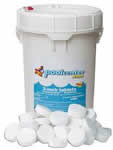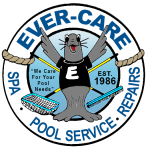 Having a pool is like having your own personal oasis. A private sanctuary where you can swim, relax, and exercise. However, keeping your pool clean and safe takes time and effort. Skimming out leaves, scrubbing algae, and keeping chemical levels balanced are just a few of the many tasks pool owners need to perform.
Having a pool is like having your own personal oasis. A private sanctuary where you can swim, relax, and exercise. However, keeping your pool clean and safe takes time and effort. Skimming out leaves, scrubbing algae, and keeping chemical levels balanced are just a few of the many tasks pool owners need to perform.
Despite the popularity of pools in Southern California, taking proper care of them is still something of a mystery for many homeowners. We don’t blame you if you don’t know where to begin; after all, keeping a pool isn’t as straightforward as vacuuming a carpet or scrubbing a bathtub! In fact, there are many common myths and misperceptions about pool maintenance. Here are a few things we often hear:
- If the water is clear, it’s clean and safe to swim in.
- Pool water can’t get you sick.
- Saltwater pools don’t need chlorine.
- If your eyes are red and itchy, that means the pool is clean.
- Chlorine kills ALL germs.
- If the pool smells like chemicals, it’s safe to swim in.
- Blondes shouldn’t chlorinate their pools because it will turn their hair green.
- You don’t need to shower before using the pool (or after getting out of it).
- It’s safe to pee in the pool because the chlorine will wash it away.
As you can see, there are lots of common rumors about pool care. Here at Ever Care Pool and Spa, our pool cleaning service specialists know the hard science behind what needs to be done to keep a pool truly clean. We’ll make sure your pool is clean, safe, and ready to swim in all year round.
Signs You Need a Pool Cleaning Service
On those sunny California days you want nothing more than to jump in your pool and soak up some rays. Before you get in, however, it’s important to make sure that the water is safe for swimming. Luckily, your pool has ways of letting you know to steer clear until pool maintenance is performed. Cloudy water, algae, and foam are just a few of the signs that pool maintenance is overdue.
Cloudy or Green Pool Water Algae
Clean pool water is crystal-clear with a slightly bluish tint. If the water looks cloudy and you’re struggling to see the bottom of the pool, that’s a clear indication that something is amiss. There are a couple of common causes of cloudy pool water. The most likely cause is that your pool needs pool maintenance. However, even recently cleaned pools can become cloudy if they’re exposed to environmental pollution or oversaturated with chemicals. High levels of organic materials and chemicals can also turn your clear pool water into a murky haze.
Foam
A few bubbles here and there are totally normal, especially when the pool is in use, but persistent bubbles are a problem. If you notice patches of bubbles lingering in your pool long after they should have popped naturally, your pool is likely contaminated. Usually, the culprit is an oily substance like sunblock or lotion. However, foam can also be indicative of a chemical imbalance, clogged filters, or an excessive amount of bacteria.
Stains
Just like clothing stains, stains in your pool look unsightly and are a sure sign that it’s not as clean as it could be. Stains can be caused by a variety of things, both organic and non-organic. Organic stains are caused by debris from the environment like leaves, flowers, berries, or fruits falling off nearby trees. Rust can also be caused by pipes or metal pool fixtures.
Health Reasons to Use a Cleaning Service
 Maintaining a pool isn’t just about keeping the water clean and pleasant to look at. Even a pool that looks clean at first glance can have underlying bacterial problems or chemical issues! A professional pool cleaning service will ensure your pool is scrubbed clean, the pH and chlorine levels are in check, and the filters and motors are clean and running efficiently. Without thorough pool maintenance and cleaning, your pool can quickly become overrun by bacteria, algae, mildew, and mold. Not only do these look unsightly, but they can have a serious impact on your health, too.
Maintaining a pool isn’t just about keeping the water clean and pleasant to look at. Even a pool that looks clean at first glance can have underlying bacterial problems or chemical issues! A professional pool cleaning service will ensure your pool is scrubbed clean, the pH and chlorine levels are in check, and the filters and motors are clean and running efficiently. Without thorough pool maintenance and cleaning, your pool can quickly become overrun by bacteria, algae, mildew, and mold. Not only do these look unsightly, but they can have a serious impact on your health, too.
Frequently Asked Questions
Keeping a pool clean is tricky. We’re used to hearing lots of questions from our clients and fellow pool owners. While we’re always happy to answer your questions, we also put together answers for some of the most common questions we receive. Take a look at the answers below to learn more about keeping your pool pristine.
What’s Different About Maintaining a Saltwater Pool?
Both freshwater and saltwater pools share similar pool maintenance requirements. The biggest myth we hear is that saltwater pools don’t need chlorine. That’s not true. Your pool needs chlorine to stay hygienic, regardless of the salinity level. But, like most rumors, there is a kernel of truth buried underneath it. When it comes to chlorinating your pool, the method of delivery varies between saltwater and freshwater pools.
Freshwater pools use chlorine tablets, whereas saltwater pools use a chlorine generator. The generator transforms salt into chlorine gas and transfers it into the pool water. Since saltwater pools require an extra piece of equipment, you may notice a slight increase in your energy bills. The amount of chlorine your pool needs depends on the size of the pool, how frequently the pool is used, debris that gets into your pool and your local weather conditions.
What’s Different About Maintaining an Above-Ground Pool?
While basic pool maintenance tasks are very similar, above-ground pools are considered easier to take care of because they tend to be smaller and hold less water than inground pools. However, the quality of pool equipment and the level of pool cleaning service the pool receives are the two biggest factors that impact pool cleanliness.
What Should I Be Doing Between Cleaning Services?
There isn’t much to do between weekly cleanings, but if you’re only receiving monthly or bi-monthly cleaning services, there are one or two tasks you should take care of in-between.
The first thing you should do is remove any leaves or floating debris with a skimmer. This not only makes using the pool more enjoyable but will also protect filters from getting clogged. You may also need to clean debris from the bottom or sides of the pool. Once the pool is clear, you should test the pH levels and chlorine levels to ensure the pool chemistry is balanced. If the levels are off, you can add acid or chlorine to stabilize it. But naturally we will take care of all of this on your next scheduled service visit.
How Long Should the Pool Pump Run For?
Your pool pump is the most hard-working device in your pool. It’s what keeps the water circulating and clean. Without a pool filter, your pool would quickly start looking like a stagnant, dirty pond. Your pool pump should run about six hours a day for the best results. While you can technically run your pool pump for longer periods of time, keep in mind that it’s a huge energy consumer. Running your pool pump all day will make a noticeable impact on your monthly electric bill! By running it for six hours each day, you can strike a perfect balance between crystal-clear pool water and a reasonable electrical bill.
One of the best ways to stay current on your pool cleaning and other maintenance tasks is to leave it to the pros.


